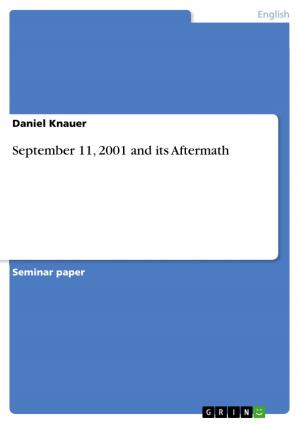| Author: | Sebastian Sturm, Robert Helbig | ISBN: | 9783638633482 |
| Publisher: | GRIN Publishing | Publication: | April 22, 2007 |
| Imprint: | GRIN Publishing | Language: | English |
| Author: | Sebastian Sturm, Robert Helbig |
| ISBN: | 9783638633482 |
| Publisher: | GRIN Publishing |
| Publication: | April 22, 2007 |
| Imprint: | GRIN Publishing |
| Language: | English |
Seminar paper from the year 2007 in the subject Economics - Monetary theory and policy, grade: 1,7, Technical University of Chemnitz, course: Methoden der Inflationsmessung, 17 entries in the bibliography, language: English, abstract: The purpose of this paper is to give the reader an understanding of Brachingers new developed theory of perceived inflation. Additionally, Brachingers new developed Index of Perceived Inflation is introduced analyzed and critically reviewed. Therefore the term paper is structured as followed: To understand the basic underlying of Brachingers theory, it is necessary to refer to the Prospect Theory, developed by Kahneman and Tversky in 1979. The main focus from Prospect theory is laid on its assumptions. In detail, the first section starts with a brief thought experiment. Afterwards the concept of reference dependency and loss aversion will be introduced. The second part of this paper deals with Brachingers work on the theory as well as on the Index of Perceived Inflation. It is shown how Brachinger derived his index from the general Laspeyres formula by adjusting for several restrictions from the Prospect theory. This chapter closes by presenting Brachingers results of perceived inflation for Germany in comparison to the actual rate of inflation after the currency changeover. The last part of this work deals with the criticism on Brachingers new developed theory. In particular, it is shown that Brachingers assumptions and simplifications are inappropriate to fully explain the phenomenon of perceived inflation. Moreover, it is illustrated that Brachingers results are inconsistent with empirical results. Finally, the paper ends up with alternative explanations which are probably capable to explain the inflation as perceived. Lastly, a conclusion is drawn which will sum up the results and the ability whether perceived inflation is revealed or not.
Seminar paper from the year 2007 in the subject Economics - Monetary theory and policy, grade: 1,7, Technical University of Chemnitz, course: Methoden der Inflationsmessung, 17 entries in the bibliography, language: English, abstract: The purpose of this paper is to give the reader an understanding of Brachingers new developed theory of perceived inflation. Additionally, Brachingers new developed Index of Perceived Inflation is introduced analyzed and critically reviewed. Therefore the term paper is structured as followed: To understand the basic underlying of Brachingers theory, it is necessary to refer to the Prospect Theory, developed by Kahneman and Tversky in 1979. The main focus from Prospect theory is laid on its assumptions. In detail, the first section starts with a brief thought experiment. Afterwards the concept of reference dependency and loss aversion will be introduced. The second part of this paper deals with Brachingers work on the theory as well as on the Index of Perceived Inflation. It is shown how Brachinger derived his index from the general Laspeyres formula by adjusting for several restrictions from the Prospect theory. This chapter closes by presenting Brachingers results of perceived inflation for Germany in comparison to the actual rate of inflation after the currency changeover. The last part of this work deals with the criticism on Brachingers new developed theory. In particular, it is shown that Brachingers assumptions and simplifications are inappropriate to fully explain the phenomenon of perceived inflation. Moreover, it is illustrated that Brachingers results are inconsistent with empirical results. Finally, the paper ends up with alternative explanations which are probably capable to explain the inflation as perceived. Lastly, a conclusion is drawn which will sum up the results and the ability whether perceived inflation is revealed or not.















